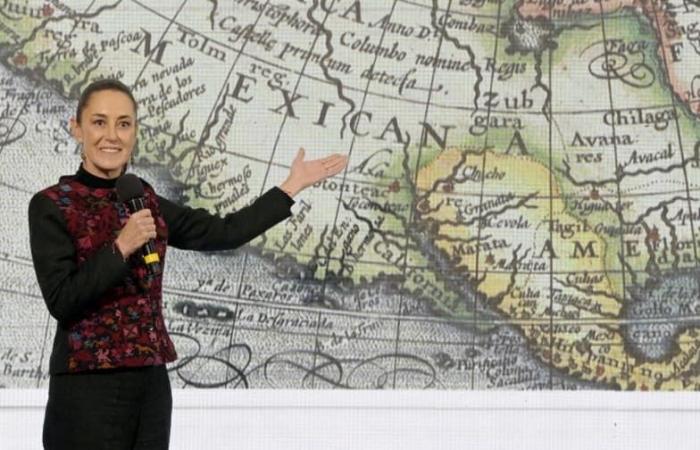“He talked about the name, we also talk about the name,” explained Claudia Sheinbaum, illustrating her point with a 17th century map.
“What a pretty name!” By proposing at the start of the week to rename the Gulf of Mexico the “Gulf of America” upon his official inauguration scheduled for January 20, Donald Trump provoked the ire of his neighbor. On Wednesday January 8, Mexican President Claudia Sheinbaum responded to her American counterpart in at least as provocative a manner.
“Obviously, the Gulf of Mexico is a name recognized by the United Nations, why not call (the United States) Mexican America, that sounds good, right?”, quipped the Mexican president during her press conference usual.
“He talked about the name, we also talk about the name,” she added, in front of a world map dating from the 17th century and on which a good part of the North American region appears under the name America Mexican.
The Mexican leader, however, reiterated that she will maintain “a good relationship with President Trump”, based “on the good relationship that Donald Trump and President (Andrés Manuel) López Obrador” (2018-2024). In addition, Mexico is the United States’ largest trading partner.
“Governed by the people”
“We are going to change the name of the Gulf of Mexico to the Gulf of America, it sounds good,” Donald Trump declared Tuesday, less than two weeks before his inauguration.
“And Mexico must stop letting millions of people into our country,” he added during a provocative conference during which he repeated his ambitions to annex the Panama Canal and Greenland.
Donald Trump also claimed that Mexico was run by drug cartels, to which Claudia Sheinbaum replied that her country was “governed by the people.”
The president-elect has threatened to impose 25% tariffs on Mexican imports if Mexico does not stop illegal migrants and drugs from entering his country. He also announced that he would classify Mexican cartels as terrorist groups.
He had already considered this measure during his previous mandate (2017-2021), finally putting it on hold at the request of the Mexican president at the time, Andrés Manuel López Obrador, who agreed to cooperate on security matters but rejected a possible American military presence on its territory.
Claudia Sheinbaum still rejects this measure today, citing the same argument as her predecessor López Obrador.






